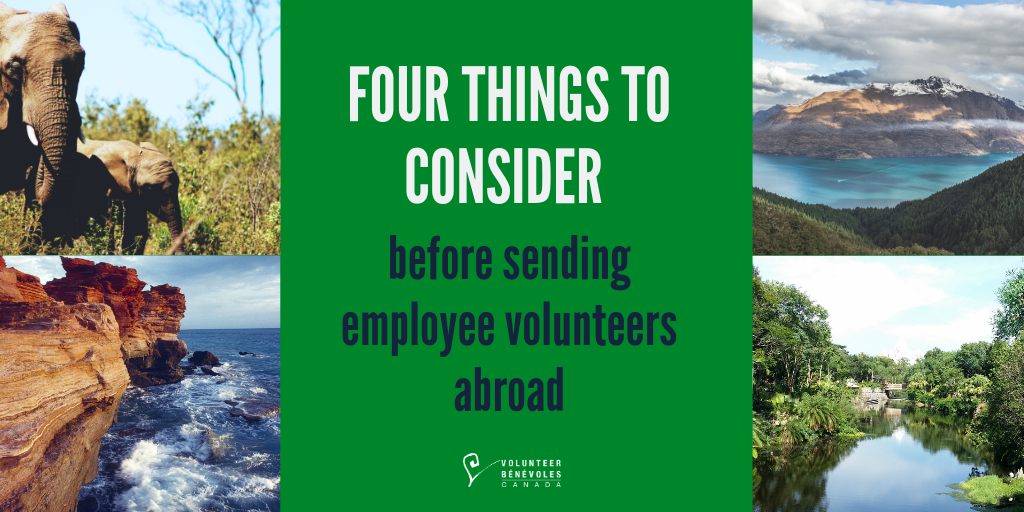
Volunteer experiences in developing countries for employees can create enormous value for the communities the volunteers serve. It can also increase employee skills and, ultimately, their performance and job satisfaction. Well-planned overseas placements–often termed International Corporate Volunteering (ICV) – often develop:
- Adaptability, resilience, innovation – Striving to attain results in a short time frame in a new environment, employees can gain new skills in creative problem solving and increased confidence in their abilities.
- Cross-cultural competency – Employees are better able to relate with customers and colleagues
- Ability to conduct business in overseas markets – Through day-to-day interactions in tailored placements, employees gain skills for navigating the unique opportunities and challenges of that business environment.
In fact a 2012 George Washington University study found that “many companies believe that the ICV experience can stimulate new insights and learning for their top employees in a way that traditional leadership development programs cannot.” It concludes that ICV programs are a better investment than businesses school leadership programs in terms of both cost and diversity of learning.
In addition to gaining a more skilled employee, following an employer-supported overseas placement,workplaces often benefit from greater employee loyalty, retention, motivation and satisfaction.
If your company is considering adding an overseas volunteer component to your employee community engagement, here are four things your company needs to consider before sending employees abroad.
1. Establish clear, mutual objectives
Volunteer Canada recommends working through an experienced intermediary organization* to develop a mutually beneficial opportunity, one that is meaningful to the volunteer while meeting the community’s needs. Match employees to causes that resonate with their interests and values. Do they want to hone their skills or learn something new? Volunteering abroad is a great way for employees to build capacity of local communities while improving their team work and problem-solving skills.
*Some organizations with experience facilitating employer-supported volunteering experiences overseas include: Cuso International, Uniterra, WE and PYXERA Global.
2. Find the right partners
Ensure a safe and positive experience for your employees when they go abroad. Whether you’re working with an intermediary organization that coordinates everything or you are working directly with a community organization abroad, take the following into consideration:
- Look for the potential of an ongoing relationship with a country and/or community partner. You can build on that relationship year after year, generating a lasting – and more measurable -impact. Employees who can’t go abroad may be able to contribute through volunteer opportunities completed virtually e.g. communications collateral to support the project or building a financial model.
- Make sure intermediary partners have local expertise. Work with a well-established organization that has local-to-that-country staff and strong relationships with the community.
- Confirm health and safety protocols. Make sure the organizations you are working with have tested systems in place to deal with warnings, medical emergencies, evacuations and counselling.
- Match for skills. Align your employees’ expertise with the needs of the community. This makes for a mutually beneficial opportunity that sees well-suited individuals make a difference in the community.
- Prepare employees; help them with re-entry. Prepare your employees before they leave with training, cultural education, cross-cultural communications, health and safety, and contingency plans. Provide re-entry support when they return, to help them readjust, reflect and make meaning of their experience.
3. Consider all the logistics
Coordinating employee volunteer opportunities is a lot of work, even when done close to home. Sending employees to volunteer outside the country adds a few other logistics that need to be considered including:
- How many employees will go? Sending employees in teams, rather than alone will make it easier for the employees to adapt to their new surrounding. This can also be an opportunity for employees to build connections across departments and locations.
- How long will they be gone for? Employees won’t be able to accomplish much in just a few days. Allocate enough time for the opportunity to make a meaningful difference in the community. Consider that international flight times, time changes and creating a functional level of comfort for employees in a new environment will take time.
- How much will it cost? Experienced intermediary organization can handle the logistics, but this will increase the cost.
- How will you measure and communicate the outcomes? The employees and the community served can tell two sides of the impact story. Your intermediary organization can also help.
- What happens to the employee’s workload while they are away? Depending on the opportunity, employees’ regular workloads may need to be modified before, during and after their placement and potentially shared with other colleagues.
4. Plan for varied employee reactions to their experience
Most people who volunteer in a developing country consider their experience life altering. How will you manage the occurrence of situations like: an employee having a negative experience who wants to return early; an employee who feels like she isn’t contributing or that he didn’t get what he signed up for; or, on the flip side, an employee that loves the experience so much that she leaves the company to pursue international work.
Although sending employee volunteers abroad adds another layer of complexity to your employer-supported volunteering program, it can be a rewarding experience for your employees that strengthens their value to your workplace and increases the positive impact your company has on the global community.
